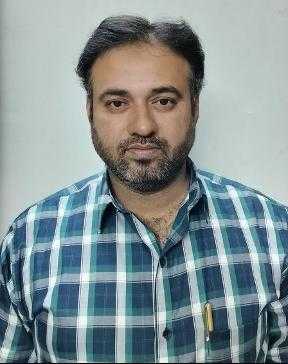
Expert Physiotherapy at Home
Certified physiotherapists visit you at home to provide focused, one-on-one care tailored to your needs. With no travel or waiting rooms, recovery happens in a setting that is comfortable, familiar, and built around your convenience.
Personalised Recovery Programmes
Every treatment plan is designed to suit your condition, goals, and pace. Our physiotherapists follow structured, evolving protocols to ensure consistent progress, with each session aligned to deliver meaningful results.
Trusted Physiotherapists. Real Results.
Our team comprises experienced, background-verified physiotherapists trusted by thousands of families. With a strong focus on safety, reliability, and clinical outcomes, we make recovery at home both effective and reassuring
Patient Testimonials
Portea Physiotherapists for Home Visits
Meet some of our experienced and dedicated healthcare professionals

Dr. Lokesh G
Physiotherapist
Specializations
Experienced in Neurological rehabilitation, Orthopaedic physiotherapy, and Paediatric care
Delivers structured, high-impact treatment plans across neuro, ortho, and paediatrics—ensuring safety, comfort, and measurable recovery at every stage.

Dr. Mohammed Sarwar
Physiotherapist
Specializations
Experienced in Neurological rehabilitation, Adult physiotherapy, and Paediatric care
Combines deep clinical expertise with a compassionate approach, supporting both adults and children through neuro and physical rehabilitation that promotes long-term independence and recovery.

Dr. Nelapati Divya
Physiotherapist
Specializations
Skilled in Orthopaedic rehabilitation, Manual therapy techniques, and Paediatric physiotherapy
Brings a personalised, hands-on approach to healing—combining structural expertise with paediatric sensitivity to restore movement, relieve pain, and improve everyday function.

Dr. Naveen V
Physiotherapist
Specializations
Trained in Pain management, Cardiac and Orthopaedic rehabilitation, Neurological care, and Neural tissue mobilisation
Brings clinical precision and empathy together—designing science-backed recovery protocols for pain relief, nerve mobilisation, and cardio-neuro-ortho rehabilitation across all age groups

Dr. Miloni Savla
Physiotherapist
Specializations
Holds an MPT in Orthopaedics with a focus on Musculoskeletal rehabilitation and strength recovery
Delivers focused, movement-oriented therapy grounded in orthopaedic science—helping patients rebuild strength, restore function, and return to daily life with confidence
Other Cities
Physiotherapy Treatments

what is orthopedic physiotherapy?
Orthopedic physiotherapy is a phrase used to define the treatment of injuries and diseases of the skeletal system including the bones, muscles, connective tissues, joints, and ligaments. This term also includes the pre and post-surgical rehabilitation of the knee, shoulder, and hips.
Ortho physiotherapy can be divided into two categories depending on the severity of the condition:
- Short term: This is done in the case of minor muscular-skeletal issues like fractures, soft tissue injuries, torn ligaments, etc.
- Long term: This is done for more complicated and persistent issues like rheumatoid arthritis, major fractures, sports injuries, paraplegia, etc.
who needs orthopedic physiotherapy?
Orthopedic physiotherapy is not restricted to seniors. It is equally important for younger people who are in need to correct orthopedic problems and reducing their symptoms. People experiencing any of these conditions benefits from orthopedic physiotherapy:
- Knee instability
- Arthritis
- Frozen shoulder
- Bursitis
- Pain in the back
- Muscular dystrophy
- Limited range of motion
- Plantar fasciitis
- Parkinson’s disease
- Strokes
- Spinal stenosis
- Lyme disease
- Sports injury
- Pregnant women
- Sedentary lifestyle
how is orthopedic physiotherapy helpful?
Orthopedic physiotherapy is extremely critical in helping a person cope with the above-mentioned problems. Some of the most important benefits include:
- Pain relief: The main aim of orthopedic physiotherapy is to relieve a person of pain and discomfort that comes with conditions like frozen shoulder, arthritis, sprains, etc.
- Pre & post surgical care: For a person to undergo surgery for musculoskeletal issues, it is required that the muscles have the necessary strength to withstand surgery. Physiotherapy helps in strengthening the muscles and joints to prepare them for surgery. Once the surgery has taken place, therapy helps the patient recover faster by increasing muscular strength, restoring the function of the operated area, and in improving mobility.
- Injury management: Physiotherapy has a great impact on people who have suffered from sports or accident-related surgeries. It helps in progressive injury management, identify and address any precursors to injury, and techniques about how to avoid such injuries.
- Mobility & independence: Physiotherapy helps a person in leading a life free of pain and mobility problems. This allows a person to travel, work, and complete her/his day-to-day chores.
- Avoiding surgery: There are certain conditions like meniscal tears, knee osteoarthritis, rotator cuff tears, etc. can be treated with physiotherapy rather than going for expensive, time-consuming, and invasive surgeries.
what are the types of exercises that help in orthopedic rehabilitation?
There are several types of orthopedic physio exercises that are known to restore your musculoskeletal system to its natural state of functioning and includes:
- Range of movement exercise: These help in reducing the rigidity of muscles by helping loosen them to help improve your range of movement.
- Strengthening exercises: These exercises are aimed at strengthening the weakened muscles to help avoid future injuries.
- Balancing exercises: These exercises help in improving the gait of a person and improve stability while walking, sitting, driving, etc.
- Stretching exercises: These exercises are aimed at removing the inertia that sets in the muscles due to injury or non-usage. They also help in relaxation and stimulation before an exercise program.
- Massages: These vary from light pressure to deep friction massages to relieve a person of pain in the muscles, tissues, or ligaments.
- Dry-needling: This involves the insertion of fine needles in the dysfunctional muscles that helps in healing trigger points of pain.
what is the role of an orthopedic physiotherapist?
The role of a therapist is extremely critical in helping patients recover from orthopedic problems. She/he plays the following roles:
- Your therapist is responsible for your orthopedic physiotherapy assessment to create an appropriate and customised treatment plan. This helps a person in healing faster.
- The therapist will initiate and execute your exercise program and help you be consistent with it.
- She/he will maintain your orthopedic physiotherapy assessment charts, medical history, and records to be submitted to your doctor from time to time.
- The therapist will act as an advisor and will advise you on lifestyle changes, stress management, postural education, etc. for an all-round wellness and good health.
- The therapist will assess risk factors associated with the types of exercises that you have been prescribed to avoid further damage or injuries. This is difficult to ascertain when you design an amateur exercise plan.
- She/he will educate not only the patient but also the family about the condition, management, and outlook.
- Your therapist can train you on how to use assistive devices like cane, crutches, or walkers properly without them causing damage to you.
how can portea help?
Portea is recognised as a credible in-home healthcare company that not only delivers quality care but also makes it affordable and accessible by letting you get the best treatment at home. We have a wide range of services including orthopedic physiotherapy that gives you these advantages:
- All our physiotherapists are trained and experienced to let you enjoy world-class healthcare.
- Since Portea lets you access therapy at home, you can heal faster in the comfort of your home. This also reduces the stress and injuries that may occur during travel and saves travel costs for you.
- By taking therapy sessions from Portea, you are more consistent with your exercise program as compared to a self-designed program that has chances of being lax.
- Our therapists are trained in the latest techniques of physiotherapy like hydrotherapy, electrotherapy, kinesiology, manual therapy, etc. to give you the maximum benefit.
- Getting therapy at home is cost-effective especially when it is a long-term requirement for you. Our services have been found to be 25-30 per cent cheaper than clinics and hospitals.
References
Doctor Consultation
Nursing
Physiotherapy
Trained Attendant
Elder Care
Mother & Baby Care
Lab Tests
Medical Equipment
Speciality Pharma
Critical Care




